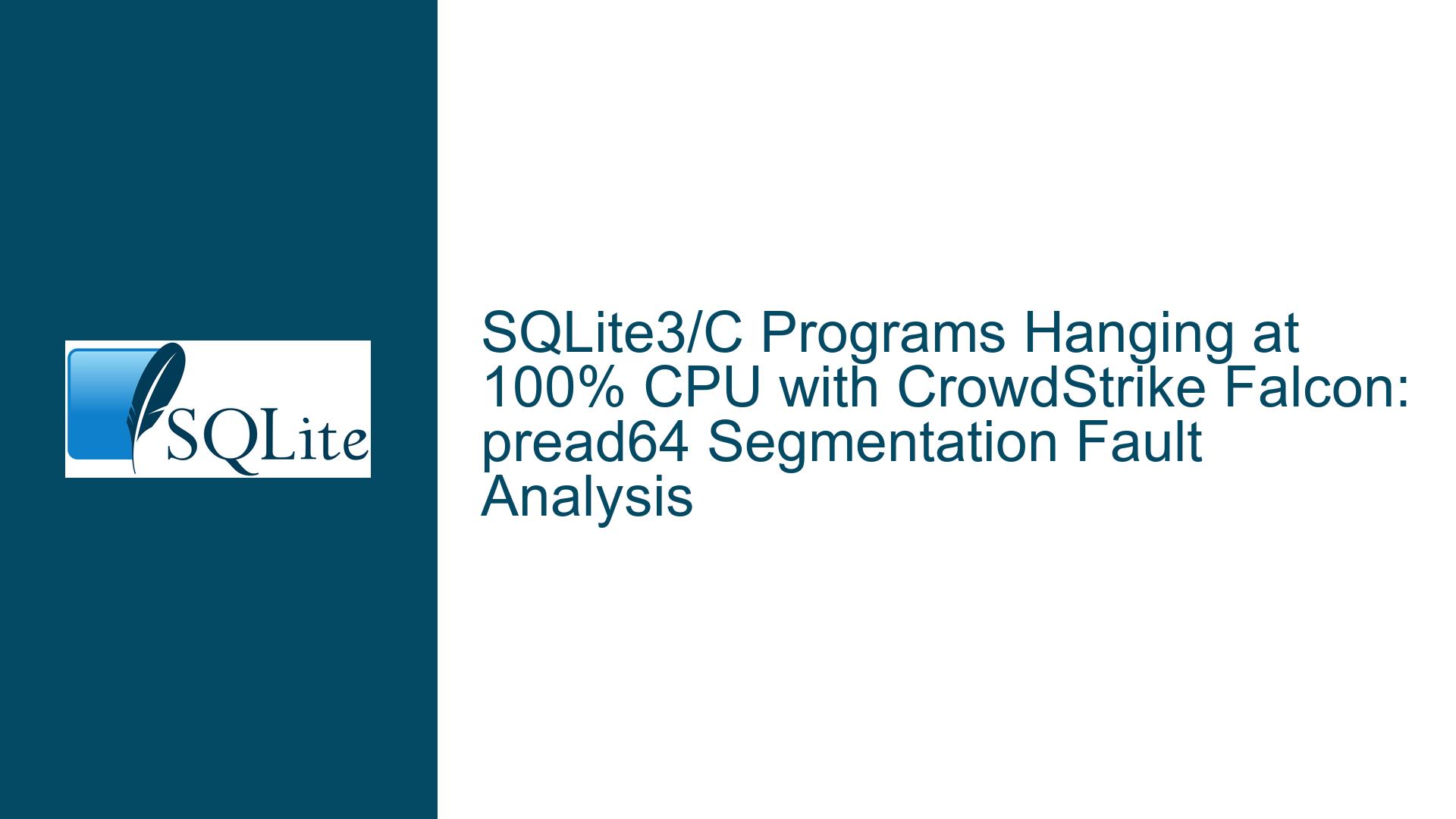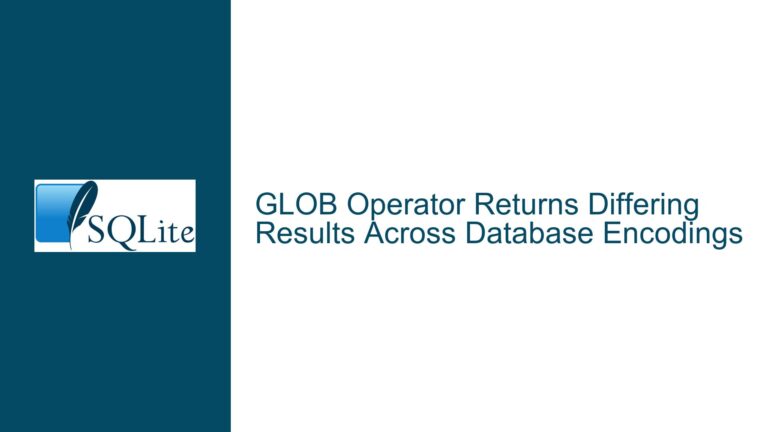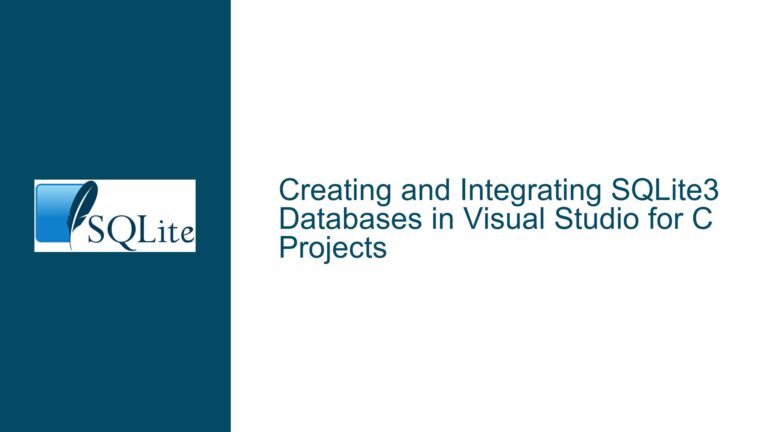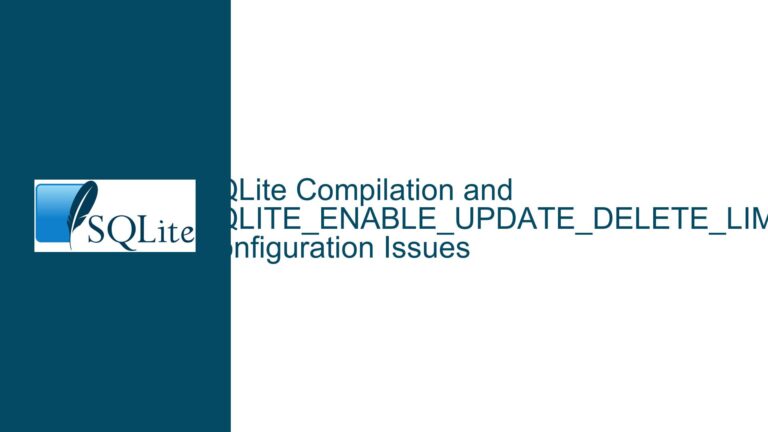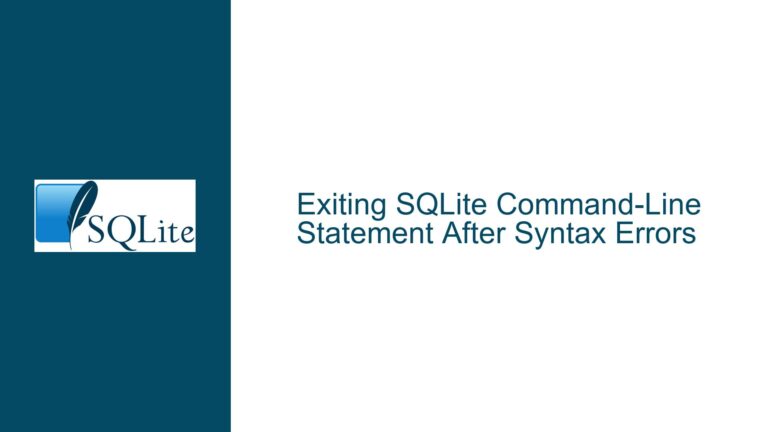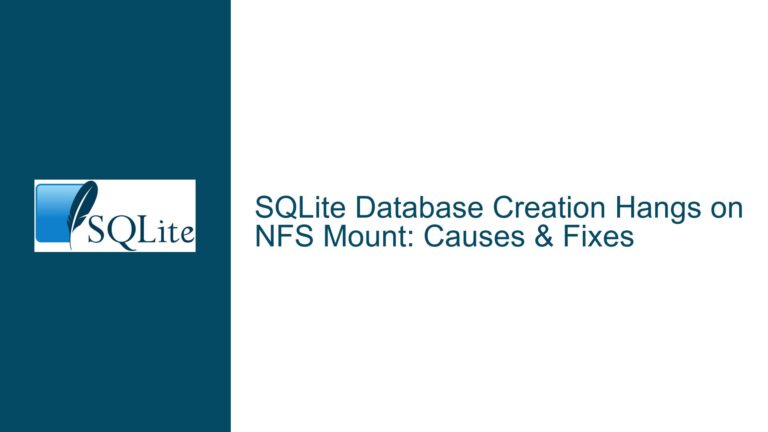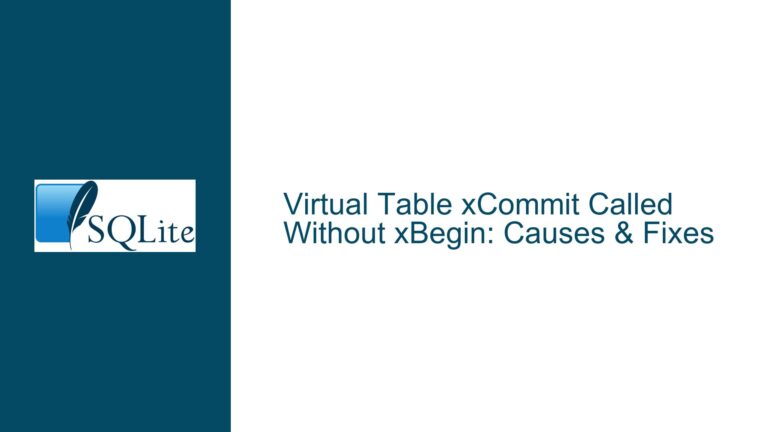SQLite3/C Programs Hanging at 100% CPU with CrowdStrike Falcon: pread64 Segmentation Fault Analysis
SQLite3/C Application Freeze at 100% CPU Utilization Post-Falcon Deployment
The core issue manifests as complete application lockup with sustained 100% CPU consumption across both compiled C programs using SQLite APIs and direct sqlite3 command-line usage. This occurs exclusively in environments where CrowdStrike Falcon’s Linux agent (falcond) is active, with immediate resolution observed when terminating the falcond service. A critical observation is the consistent segmentation fault (SIGSEGV) originating from the pread64 system call during database file read operations, as evidenced by identical stack traces across multiple crash dumps. The SQLite version involved (3.45.2 compiled from amalgamation) shows no inherent defects in its unixRead() implementation when analyzed independently. This creates a tripartite conflict between application-layer database operations, kernel-level system call execution, and endpoint protection instrumentation.
Key technical markers include the frozen state at maximum CPU utilization despite blocked I/O progression, repeated failed attempts to execute the pread64 system call through SQLite’s virtual file system (VFS) layer, and the absence of traditional error handling pathways in both user-space and kernel-space components. The stack trace progression from main() -> open_db() -> openDatabase() -> sqlite3BtreeOpen() -> sqlite3OsRead() -> unixRead() -> pread64 demonstrates failure at the boundary between SQLite’s platform abstraction layer and OS-specific file handling routines. Of particular interest is Falcon’s real-time monitoring subsystem intercepting file access patterns characteristic of SQLite’s page-oriented storage model, potentially altering standard system call behavior.
Falcon Agent Interference with Pread64 System Call Execution
The root cause analysis revolves around three interconnected elements: CrowdStrike Falcon’s kernel-mode hooking mechanisms, SQLite’s retry logic for interrupted system calls, and Linux’s signal handling architecture. Falcon’s behavioral monitoring engine likely intercepts pread64 invocations to analyze database file access patterns, introducing unexpected state changes during system call execution. SQLite’s VFS layer implements automatic retries for file operations interrupted by signals (EINTR errors), but this safety mechanism becomes pathological when combined with Falcon’s non-standard system call responses.
A deeper investigation reveals that Falcon’s kernel instrumentation may corrupt the execution context of pread64 in one of three ways: (1) Premature signal injection during file read operations, tricking SQLite into infinite retry loops. (2) Memory mapping conflicts between Falcon’s security sandbox and SQLite’s file buffer management. (3) Deadlock scenarios where Falcon’s inspection thread contends with SQLite’s exclusive database file locks. The segmentation fault in pread64 suggests either memory address miscalculations in intercepted system calls or page table entry invalidation during Falcon’s real-time file scanning operations.
The 100% CPU utilization stems from SQLite’s persistent retry attempts when system calls fail to complete but don’t return traditional error codes. Unlike typical I/O blocking scenarios where the process would enter a wait state, the combination of Falcon’s interference and SQLite’s defensive programming creates a tight loop in unixRead(). This loop continuously re-executes pread64 without yielding CPU time, as the VFS layer interprets the incomplete operation as a transient error requiring immediate retry. The SIGSEGV occurs when Falcon-modified memory addresses or buffer sizes eventually trigger access violations in subsequent retry iterations.
Resolving Falcon-Induced Pread64 Failures in SQLite Environments
First-stage diagnostics require controlled reproduction with enhanced instrumentation. Execute the sqlite3 binary under strace with Falcon active:
strace -f -e trace=pread64,read,signal -o sqlite_strace.log ./sqlite3 test.db
Analyze the strace output for abnormal pread64 return values, unexpected signal deliveries (particularly SIGSEGV/SIGBUS), or hung system calls. Concurrently monitor Falcon’s kernel module activity using auditing tools like auditd or bpftrace to detect file access policy violations.
For immediate mitigation, implement Falcon exclusions targeting SQLite’s file access patterns without disabling endpoint protection entirely:
- Add database file extensions (*.db, *.db3, *.sqlite) to Falcon’s filesystem exclusion list
- Exempt the sqlite3 binary and application executables from process inspection
- Whitelist SHA256 hashes of known-good SQLite binaries
- Disable Falcon’s memory protection features for database handling processes
If exclusions prove insufficient, reconfigure SQLite’s VFS layer to bypass problematic system calls. Recompile the SQLite amalgamation with alternate I/O strategies:
#define SQLITE_DIRECT_OVERFLOW_READ 1 /* Bypass page cache */
#define SQLITE_USE_PREAD64 0 /* Force read()/lseek() */
This shifts from pread64 to traditional read/lseek combinations, potentially avoiding Falcon’s hook points. Validate the approach by testing multiple I/O methods through SQLite’s multiple VFS implementations.
For long-term resolution, coordinate with CrowdStrike support to analyze kernel module interactions. Provide core dumps demonstrating the pread64 fault context and request detailed Falcon sensor logs containing system call interception records. If Falcon’s EDR stack utilizes eBPF probes, audit the BPF programs for improper memory accesses during file read operations. Consider deploying a Falcon sensor with debug symbols to capture precise instrumentation data during SQLite file operations.
Application-level hardening measures include implementing SQLite’s URI filename parameters to enforce strict file locking protocols:
sqlite3 'file:/usr2/Atis/Db/dbstop.db3?mode=ro&nolock=1'
Combine this with increased I/O timeout settings using sqlite3_busy_timeout() and defensive retry loops in application code. For mission-critical systems, transition to WAL mode with synchronous=NORMAL to reduce exclusive lock contention points that might trigger Falcon inspection.
Persistent cases may necessitate kernel parameter tuning to prevent system call interference. Adjust Linux’s signal delivery behavior with:
sysctl -w kernel.signal_delivery_policy=0x1 /* Allow nested signal handling */
And modify virtual memory overcommit settings to prevent premature OOM kills during Falcon/SQLite memory contention:
sysctl -w vm.overcommit_memory=2
sysctl -w vm.overcommit_ratio=95
Full-stack debugging requires simultaneous capture of SQLite’s internal state, kernel system call execution, and Falcon sensor activity. Utilize GDB with non-invasive tracing:
gdb -ex 'set pagination off' -ex 'set logging on' -ex 'catch syscall pread64' -ex 'run' --args ./sqlite3 test.db
Cross-reference the syscall breakpoints with Falcon’s process monitoring dashboard to identify inspection hooks that alter pread64 parameters or return values.
Ultimately, the path to resolution lies in collaborative debugging between application developers and Falcon’s engineering team, as the fault manifests in the opaque interaction between security instrumentation and database I/O primitives. Temporary workarounds should focus on I/O method diversification and Falcon policy tuning, while permanent fixes require CrowdStrike to address their pread64 interception logic for SQLite-compatible operation.
